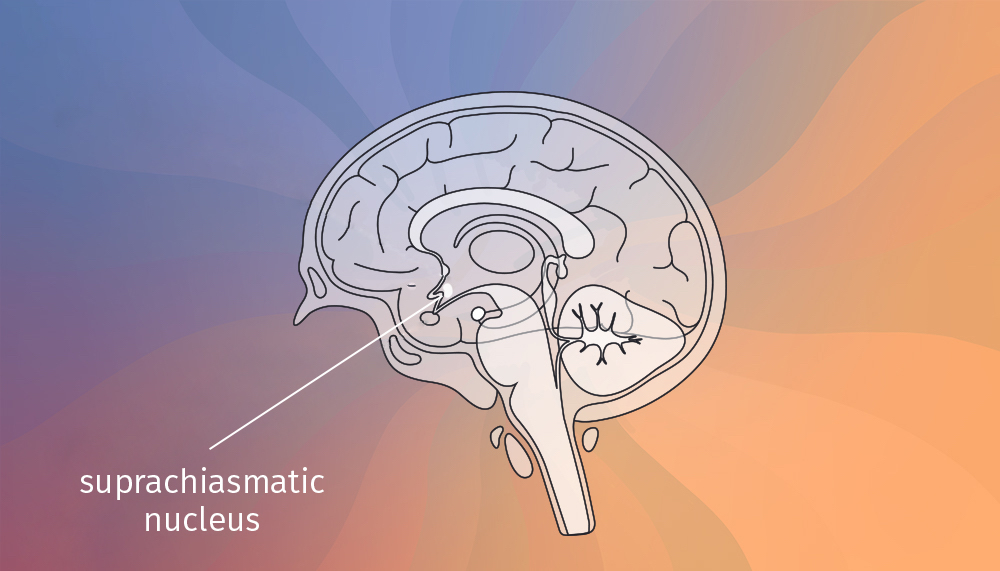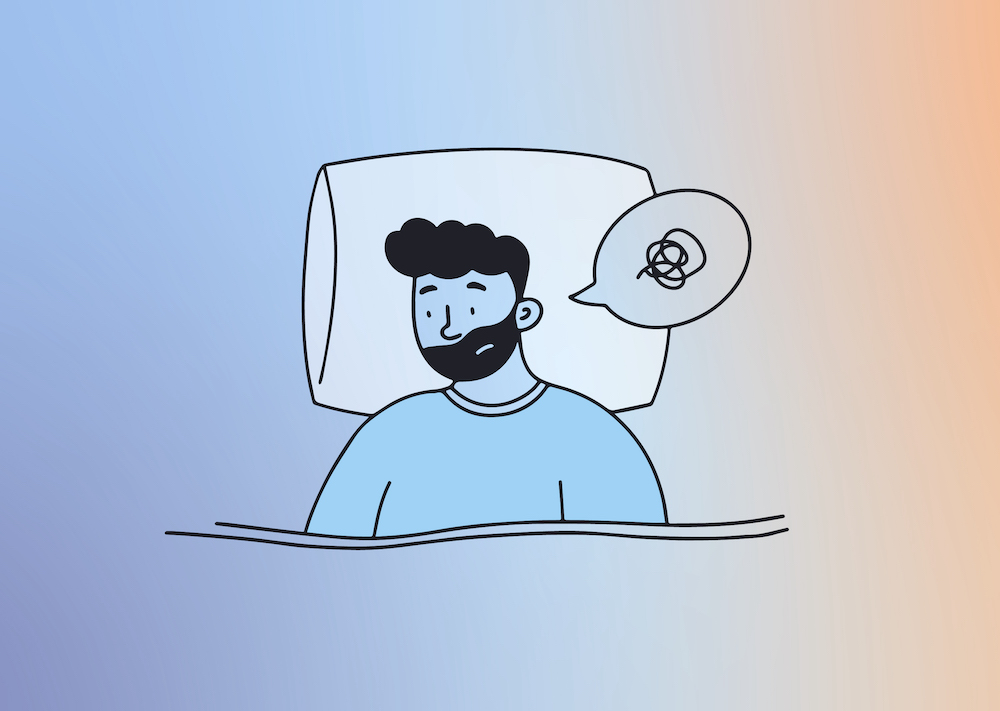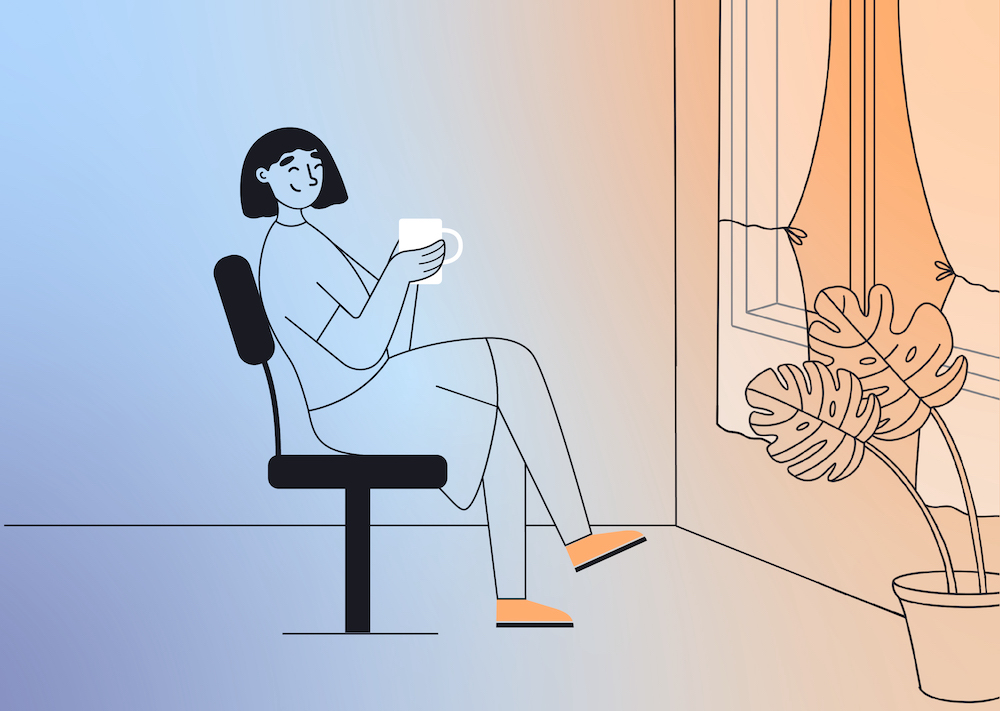Do you ever wish you could fall asleep and wake up at will, feeling rested and refreshed? Have you experienced jet lag or had trouble adjusting to an earlier schedule at work? Does your addiction to your phone keep you up late at night? If you answered “yes” to any of these questions (and we’re guessing you did), you might benefit from becoming better acquainted with your circadian rhythm. Below, we’ll explain what a circadian rhythm is, how it impacts your sleep, what can mess it up, and what you can do to optimize it.
Editor’s Note: This article does not take the place of medical advice. If you believe you may have a sleep disorder or need help with your sleep health, please consult a trusted medical professional.
What is a Circadian Rhythm?
Our bodies have many natural rhythms. Without even thinking about it, we know when it’s time to perform certain behaviors. According to the National Institutes of Health (NIH), “circadian rhythms are physical, mental, and behavioral changes that follow a 24-hour cycle.”
Circadian rhythms regulate sleepiness and wakefulness, body temperature, and hormonal changes. These rhythms are essential to our bodies and brains functioning as they should, and they allow us to stay healthy and function in society.
How are Circadian Rhythms Regulated?
Circadian rhythms are regulated by both internal and external factors. The most important external factor is light. The 24-hour solar cycle allows our bodies to develop and maintain circadian rhythms.
While most people have the same basic circadian rhythms, there are some variations from person to person. Gene mutations can change one’s natural biological rhythms, as can hormonal disturbances.

What Regulates Your Circadian Rhythm?
The relationship between our biological clocks and the 24-hour solar cycle regulates the body’s circadian rhythms. We all have multiple biological clocks controlled by a master clock known as the suprachiasmatic nucleus (SCN). Photoreceptors in the eyes provide information about light to the SCN, and thus our light-based 24-hour cycles are born. This master clock is housed in the hypothalamus–the part of our brain in charge of hormone production and release.
The circadian rhythm can be regulated to a lesser extent by certain daily activities. Some examples include:
- Exercise: Research indicates that exercising at certain times of the day can temporarily shift what time you fall asleep and wake up.
- Diet: When you eat has an impact, though less is known about how to use meal timing to shift one’s circadian rhythm.
- Temperature: Our body temperature naturally increases in the morning and decreases in the evening as part of our circadian rhythm. You can mimic these changes with cold showers or warm baths to influence wakefulness and mood.
How Circadian Rhythm Impacts Sleep
We like to think we’re consciously in control of when we sleep, but that’s not entirely true. While we can try to force ourselves to sleep and wake outside our body’s natural cycle, unpleasant symptoms such as tiredness, irritability, and poor immune function result.
Our circadian rhythm tells our body when it’s time to feel awake or sleepy. It does this by regulating the release of melatonin and cortisol–the “sleep” and “wake” hormones. By releasing these hormones at programmed times throughout the day and night, our body directly impacts when we fall asleep and wake up.

What Your Circadian Rhythm Looks Like
A normal circadian happens when your master clock is in tune with the 24-hour cycle of daylight and darkness. Someone with this rhythm will experience various physiological changes throughout the day that impact wakefulness.
Melatonin production stops around 7:30 a.m., followed by increased alertness peaking at 10 a.m. A mid-afternoon dip in energy occurs around 2 p.m. – 4 p.m., and feelings of alertness predominate between 7 p.m. and 9 p.m. Melatonin secretion starts back up at 9 p.m., and sleepiness builds between then and bedtime.
What Can Affect Your Circadian Rhythm?
The following can disrupt circadian rhythm in the short and long term.
Lighting
Before artificial light, our bodies knew when to wake and sleep based on the sun’s natural light. We haven’t evolved to adjust to artificial light, so many people experience circadian rhythm disruptions due to artificial light exposure.
Using artificial light in our homes after sunset tricks our brains into thinking it’s still daylight. The biggest culprit in this arena is blue light. Evening exposure to blue light from our phones and other devices suppresses melatonin production, making us feel awake later in the evening than we otherwise would.
Shift Work
Shift work and night work disrupt circadian rhythms because workers cannot establish normal sleep and wake times based on sunlight exposure. Rotating shift work, where the timing of employees’ shifts can vary daily, is especially bad for sleep health. Not only are shift workers unable to coordinate their circadian rhythm with the sun, but they cannot establish consistent sleep patterns at all.
Night work is also tricky, though at least night workers can establish a sleep/wake pattern. Workers should make their environments dark in the hours before sleep and bright when they work to trick their bodies into releasing these sleep and wake hormones at the best time for their sleep schedules.
Jet Lag
When you travel between time zones, your brain and body don’t know that a change has taken place. If you travel five hours ahead, when you need to wake up at 7 a.m., your body will think it’s 2 a.m. and you will feel tired.
It takes between two days and a full week to adjust. A rule of thumb is one day to fully adjust to each 1 hour time change. If you travel in the other direction, where you “gain” time, the body adjusts more quickly. For people who travel often, this can cause significant disruptions to their circadian rhythm.
Sleep Disorders
As wonderful as it would be if we all had perfectly functioning circadian rhythms and healthy sleep, that is not the case. Various sleep disorders can lessen the quality or timing of our sleep, including:
Circadian rhythm disorders impact the body’s sleep/wake cycles. Those with advanced sleep-wake phases sleep and wake early, and those with delayed sleep-wake phases sleep and wake late. This can be caused by genetics, as some people are naturally early risers or night owls, or by lifestyle and hormonal factors. Irregular sleep-wake rhythm disorder is rare and is characterized by multiple bouts of sleep within a 24-hour period.
Non-24 sleep-wake disorder primarily affects blind people, who cannot establish a 24-hour cycle based on light. Because their SCN does not receive light input from the eyes, the circadian rhythm cannot function properly. Sufferers will often experience significant disturbances in their sleep-wake rhythms as a result.
Sleep apnea is a common disorder in which the sleeper experiences pauses in breathing or gasps for air while asleep. The most common type of sleep apnea is obstructive sleep apnea, which results from the relaxation of the back of the throat leading to obstruction of the airway. Sleep apnea can significantly reduce sleep quality, but sleep can improve substantially with the use of a CPAP machine.

Insomnia is the most common sleep disorder and occurs when a person has trouble falling or staying asleep. This can result in feelings of daytime tiredness and irritability. Insomnia can be acute or chronic; chronic insomnia often necessitates medical intervention.
Restless leg syndrome is another condition that lessens the quality of sleep. Sufferers of restless leg syndrome experience uncontrollable leg movements and can find it difficult to fall or stay asleep.
Age
Your natural circadian rhythm changes throughout your lifetime. Because there is no light in the womb, newborn babies do not yet have an established sleep-wake cycle. Babies develop their circadian rhythm between three and nine months of age.
Teens experience a drastic circadian rhythm shift when they hit puberty. It is normal for teens to go through what is known as a sleep phase delay at this time. They start to feel tired around 10 or 11 p.m. rather than 8 or 9 p.m. This can cause problems if they need to wake up early for school and start to get less sleep, so you can encourage your teen to sleep more by investing in a high-quality mattress for teenagers.
According to Johns Hopkins Medicine, a normal adult circadian rhythm involves growing tired well before midnight and feeling sleepiest between 2 a.m. and 4 a.m. and 1 p.m. and 3 p.m.
As we age into our senior years, we experience the opposite of what happened as a teen–a sleep phase advance. Elderly adults find themselves getting tired around 7 or 8 p.m. and waking up around 3 a.m. It is also common for older adults to get less sleep overall due to delaying sleep but still being woken up early by their biological clocks.

Can You Change Your Circadian Rhythm?
You can adopt a lifestyle that keeps you on a regular circadian rhythm. It just takes the carefully scheduled repetition of certain cues to convince your body to change its circadian rhythm. Part of our circadian rhythm is hard-wired, so if you’re strongly a morning person, or strongly a night person, that won’t change entirely.
Some people find success using light therapy and sun exposure to ensure they are being exposed to enough bright light at certain times of the day, particularly at the beginning of your day. Doing so ensures that your body will begin producing melatonin at the ideal time for sleep. You can also nudge your body towards your new desired sleep schedule by slowly changing your bedtime and meal times.
Tips for Maintaining a Healthy Circadian Rhythm
Keeping your circadian rhythm normal is an important part of maintaining sleep health. To support a normal circadian rhythm:
- Seek out sunlight during the day and avoid light at night, especially blue light in the hours before bedtime
- If you can’t avoid screen time before bed, try out blue light blocking glasses to limit blue light exposure before you fall asleep
- Follow a bedtime and wake up time that allows you to get at least 7 hours of sleep
- Avoid sleeping in late on weekends or otherwise changing your sleep schedule
- Avoid caffeine / alcohol at night
- Eat regular meals
- Exercise
Final Thoughts
Getting high-quality sleep is essential to living a healthy life, and we can thank our circadian rhythms for keeping us in check. Though many sleep disorders exist that throw off our natural sleep/wake cycles, there are steps we can take to get things back in line. And while our body’s biological clocks exist to benefit us, if you need to shift your circadian rhythm, that’s possible, too. By better understanding your circadian rhythm, you can learn to sleep better.

